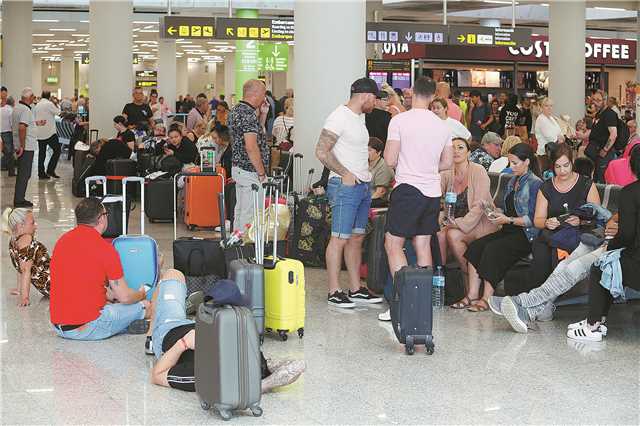World's oldest travel business ceases trading
By Jonathan Powell in London | China Daily Global | Updated: 2019-09-24 03:49

Thomas Cook fails despite last-minute interest from China, 150,000 stranded
Britain's oldest travel company Thomas Cook has gone into liquidation and an operation has begun to repatriate 150,000 of its passengers stranded overseas.
The 178-year-old holiday company, also one of the world's biggest, collapsed after last-minute negotiations aimed at saving it failed, triggering what is being described as the biggest-ever peacetime repatriation since World War II.
The UK Civil Aviation Authority, or CAA, a public corporation within the Department of Transport, said the tour operator had "ceased trading with immediate effect".
China's Fosun Group, which had led a last-ditch bid to rescue the British travel giant from bankruptcy, on Monday said it was "disappointed" that the effort had failed.
"Fosun is disappointed that Thomas Cook Group has not been able to find a viable solution for its proposed recapitalization with other affiliates, core lending banks, senior noteholders and additional involved parties," Fosun said in a statement to AFP.
"Fosun confirms that its position remained unchanged throughout the process, but unfortunately other factors have changed."

Thomas Cook had announced last month that Fosun, which was already its biggest shareholder, would inject 450 million pounds ($560 million) into the business as part of a 900-million-pound rescue package.
In return, the Hong Kong-listed conglomerate was to acquire a 75 percent stake in Thomas Cook's tour operating division and 25 percent of its airline unit.
Creditors and banks agreed to inject another 450 million pounds under the recapitalization plan, converting their debt in exchange for a 75 percent stake in the airline and 25 percent of the tour operating unit.
An earlier version of its statement in reaction to the collapse said: "Fosun will continue to increase investment and cooperation in the UK market." But the statement offered no details, and that line was dropped from later amended versions.
Thomas Cook in May revealed first-half losses that it claimed were caused in part by Brexit uncertainty that delayed summer holiday bookings.
It's reported that 9,000 jobs will be lost as a result of the collapse, and the CAA said it was now beginning the unprecedented operation to repatriate the company's customers.
The government financial protection scheme Atol, which is administered by the CAA, now faces a wave of compensation claims from passengers booked on future package tours.
The Financial Times reported that passengers booked on package holidays with Thomas Cook may not receive financial compensation until late November.
By law, all package holidays sold in the UK must be covered by Atol, which guarantees to fly passengers home for free in the event of a package tour operator's collapse and refund those who have booked a future trip.
Following the collapse of Monarch airlines two years ago, the CAA had to repatriate 85,000 holidaymakers, at a cost of 60 million pounds, and process 32,000 Atol compensation requests worth more than 21 million pounds.
Many Monarch customers were not covered by Atol because they only purchased flights and not package holidays, which is why the estimated cost of compensating Thomas Cook customers is much higher, and could amount to 600 million pounds.
























